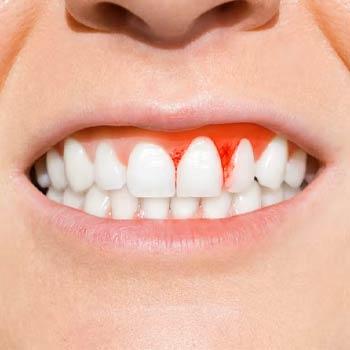Gum disease, also known as periodontal disease, is a common dental condition that affects the tissues surrounding the teeth. It can range from mild inflammation to severe damage that may lead to tooth loss. In this comprehensive guide, we will explore the causes, symptoms, and treatment options for gum disease to help you better understand and prevent this oral health issue.
What is Gum Disease?
Gum disease is an infection of the tissues that surround and support your teeth. It's caused by bacteria in plaque, a sticky film that forms on your teeth. When plaque is not effectively removed through regular oral hygiene practices like brushing and flossing, it can harden into tartar, leading to inflammation and infection.
Types of Gum Disease
Gingivitis
Gingivitis is the earliest stage of gum disease. It is characterized by red, swollen gums that may bleed easily during brushing or flossing. Fortunately, gingivitis is reversible with proper oral care.

Periodontitis
If gingivitis is left untreated, it can progress to periodontitis. In this stage, the inner layer of the gum and bone pull away from the teeth, forming pockets that can become infected. As the disease advances, these pockets deepen, and the supporting bone may be destroyed.
Advanced Periodontitis
In the final stage, advanced periodontitis, the connective tissues that hold teeth in place are severely damaged. This can lead to tooth mobility and, in some cases, tooth loss.
What are the Causes of Gum Disease ?
Several factors contribute to the development of gum disease. Understanding these factors is crucial for effective prevention.
- Poor Oral Hygiene: Inadequate brushing and flossing allow plaque to build up, leading to gum inflammation and disease.
- Tobacco Use: Smoking or using smokeless tobacco increases the risk of the disease. It also makes treatment less effective.
- Poor Nutrition: A diet lacking in essential nutrients can compromise the immune system, making it harder for the body to fight off infection.
- Medical Conditions: Conditions such as diabetes and autoimmune diseases can increase the risk of gum disease.
- Genetics: Some individuals may be more predisposed to gum disease due to genetic factors.
What are the Symptoms of Gum Disease?
Recognizing the signs and symptoms of gum disease is crucial for early intervention. Common indicators include:
- Gums that bleed easily during brushing or flossing
- Persistent bad breath
- Red, swollen, or tender gums
- Receding gums or teeth appearing longer
- Pain while chewing
- Loose or shifting teeth
- Changes in the fit of dentures
What type of Treatment Options Available?
The treatment of gum disease depends on the severity of the condition. Early-stage gum disease (gingivitis) can often be addressed with improved oral hygiene practices, including professional dental cleanings. For more advanced cases, treatment may be involved.
Scaling and Root Planing
This non-surgical procedure removes plaque and tartar from below the gumline and smoothens the tooth roots to prevent further bacterial growth.
Medications
Antibiotics or antimicrobial medications may be prescribed to control infection and inflammation.
Surgical Interventions
In severe cases, surgical procedures such as flap surgery or bone and tissue grafts may be necessary to repair damage and restore oral health.
Prevention is Key
Preventing gum disease is far easier than treating it. Here are some effective preventive measures:
- Regular Dental Check-ups: Schedule regular dental visits for professional cleanings and check-ups.
- Brush and Floss Regularly: Maintain a consistent oral hygiene routine to remove plaque and prevent its buildup
- Healthy Lifestyle: Quit smoking, maintain a balanced diet, and manage conditions like diabetes.
- Use Antiseptic Mouthwash: An antiseptic mouthwash can help reduce plaque and bacteria in the mouth.
- Stay Informed: Be aware of the signs and symptoms of gum disease to seek prompt treatment if necessary.
Gum disease is a common but preventable and treatable condition. By understanding its causes, recognizing its symptoms, and adopting good oral hygiene practices, you can maintain healthy gums and a beautiful smile for years to come. If you suspect you may have gum disease, consult the best dental doctor in vijayawada for a proper diagnosis and personalized treatment plan.
frequently asked questions
Take the first step towards optimal oral care, consult the best dentist now
